I was surprised to learn that the bottom had already fallen out of the pot market in Michigan.
Apparently the Wolverine State now produces three times as much legal cannabis as consumers need (or presumably, want).
As a result, the price per ounce is now around one-quarter of what it had been.
A national weed glut is causing prices to plummet and imperiling businesses
Same problem in Colorado, one of the pioneers along with Washington in the legalization movement. They’re seeing price drops of 50% for the recreational stuff. I understand the smaller commercial pot businesses, the ones less well financed — there are a lot of those around — are teetering on the edge of failure.
We were told to expect a ‘shakeout’ of the marketplace at some point, but this quickly? I don’t think so. States like Missouri only legalized a year ago, and the bottom is already falling out of their market. Demand’s up, but profits are way down.
If the so-called ‘recreational’ or ‘adult-use’ stuff is now so cheap, wouldn’t that likely undermine the demand for ‘medical’ marijuana? Why bother getting a card when comparable product is available at a deep discount from the friendly neighborhood pot store?
Apparently the problem in Michigan is really a matter of ‘over-cultivation’. State government, critics say, issued way too many licenses to aspiring pot producers. Those same businesses, by the way, had been campaigning to loosen restrictions on new approvals. I guess it worked.
Maybe things would be better if it hadn’t.
Seems to me that has to reflect seriously flawed planning. Why didn’t the experts foresee it? State departments of agriculture employ PhDs who devote their time to predicting yields for all sorts of crops.
What about cannabis?
The article goes on to speculate that with the GOP in control of the House of Representatives, it’s unlikely the outlook for the industry will improve anytime soon.
From the consumer’s viewpoint, naturally, a drop in price is a good thing. It’s the small businesses that are directly threatened. They’re still on the hook for state taxes, of course. The numbers simply won’t match up.
It’s particularly disappointing for advocates of full legalization, because one of their strongest arguments had been that when cannabis was legal, small community-based businesses, many minority-owned and operated, would be guaranteed a competitive position in the marketplace. Instead, it’s starting to look as if those hopes won’t be realized.
Not coincidentally, a stubbornly strong black market continues to be part of the problem. Some of that illegally-produced pot, we’re told, can now be found on store and dispensary shelves, alongside the legal stuff. It’s not supposed to be there, but it is.
How does that happen? I’m sure the States would like to know, so they could put a stop to it.
Not an easy task, when the bottom line is working against you.













